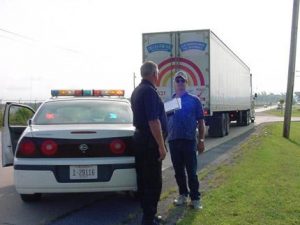
Oklahoma’s three Corporation Commissioners have come out against a legislative task force recommendation to remove trucking enforcement from the agency and transfer it to the Department of Public Safety. They argue such a move will end up costing millions for taxpayers.
“The OCC is gravely concerned with the proposal,” declared Commissioners Todd Hiett, Bob Anthony and Kim David, in a letter to Matt Herndon, chairman of the State Task Force on Motor Carrier Regulation and Enforcement.
The three warned such a move to dismantle the state’s “successful trucking enforcement program” would result in a “rash of unintended consequences that will cost taxpayers millions” and hamper Oklahoma’s trucking industry. They further claimed it would “put at risk the multi-billion dollar investment in the state’s road and bridge infrastructure.”
The State Task Force on Motor Carrier Regulation and Task Force is recommending a proposal to move Oklahoma Corporation Commission (OCC) transportation enforcement officers from the OCC to the Department of Public Safety (DPS), while leaving certain Motor Carrier regulatory duties in place at the OCC.
Commissioners warn the move will result in higher expenses for the enforcement program, overwhelm district courts with citations currently handled by the OCC’s court system, result in court costs for truckers who currently have no such costs for OCC-handled citations, and cause potentially catastrophic fiscal impacts to the state from the disruption of nationally-mandated programs.
In their letter, the Commissioners said it could mean $15 million more in expenses to fund the program under the DPS.
“If the goal of the Task Force is to increase the number of safety inspection officers in Oklahoa, there are less expensive and disruptive methods to accomplish this goal that would not require rewriting hundreds of sections of law, further burdening Oklahoma taxpayers, or incurring the risk of disrupting motor carrier regulation in Oklahoma,” wrote the commissioners.
The Commissioners recommend instead a simple approach to improve the already-successful regulatory arrangement between the OCC, DPS, and the Oklahoma Department of Transportation:
(1) The Legislature should unify the fine structure across agencies and raise vehicle overweight violations to a level comparable to surrounding states with the additional revenue allocated to DPS to hire additional officers for its safety programs; and,
(2) Make the OCC a partner-agency with DPS by signing a memorandum of understanding for the purpose of conducting safety inspections.




